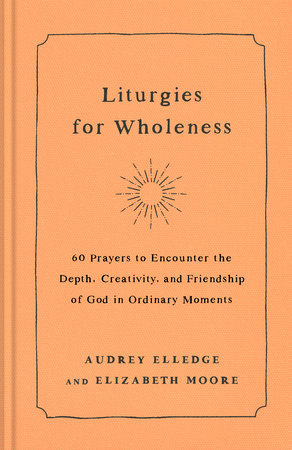Excerpt
Liturgies for Wholeness
A Note on Liturgy Perhaps
liturgy is a new word for you. Maybe you grew up in a tradition that practiced liturgy, but it feels irrelevant and outdated now. Or maybe liturgy, with its rootedness and sacraments, is something you have only recently longed for.
Historically, liturgical prayer refers to responsive, communal prayer that is usually repeated in a worship service to direct people toward God. By repeating words based on Scripture—which has been spoken by all sorts of people throughout history—liturgical prayer invites us into rich communion with both God and generations of worshippers who came before us. Liturgy reminds us that we are not alone—our stories are woven together with the stories of others who have repeated the same words and who have reached for God in their pain and joy.
Formation is at the heart of liturgy. Through liturgy, we learn the practices and rhythms of faith that shape our hearts, minds, desires, convictions, and whole selves. Liturgy forms us in the way of Jesus, which is to say, it forms us into the people we are meant to be.
In this book, when we use the word
liturgy, we are referring to an original, pre-written prayer based on the comfort, truth, and wonder found in Scripture. We believe our daily lives present us with an opportunity to participate in liturgy, so we put words to some common experiences—washing our face, grocery shopping, napping, dancing—all through which we can encounter the Divine. You’ll also find prayers to guide you through life’s highs and lows: falling in love, healing a broken heart, receiving a diagnosis, overthinking, forgiving.
If you’re at a loss for words, need fresh inspiration, or just feel exhausted, we pray these liturgies provide a steady, comforting framework for your own prayers. We wrote these liturgies to give language to the wonder and wrestling in your mind, body, heart, and soul. And we hope these liturgies invite you into a community of people praying the same words, anchored in the knowledge that God sees us and calls us beloved.
How to Use This Book We are all beginners when it comes to prayer.
If you’ve never prayed a day in your life, you are welcome here. If prayer is a part of your daily spiritual practice, you are welcome here. If you’ve picked up this book seeking nourishment through prayer—welcome. In these pages, you’ll find liturgies to orient your entire being toward wholeness. By addressing topics that pertain to the mind, the senses, the body, the heart, and the soul, as well as our homes, communities, and world, these prayers aim to bring all the parts of ourselves to God.
This book will live best on your nightstand, in your backpack, or on the passenger seat of your car—available to be picked up as needed. While you could read this book cover to cover, we hope you frequently scan the table of contents and find language that speaks to what you, a friend, or a loved one is going through. Feel free to use these liturgies individually, in the quiet of your room or in the chaos of your life, as well as corporately, reciting them as a community with the intention of being collectively formed.
As you read one liturgy at a time, take a deep breath. Read each line slowly and thoughtfully. Allow every word to land softly on your heart. Speak them directly to God and resolve to be fully honest with Him. Hope more wildly than you’ve ever dared to before and listen quietly for the Father’s encouraging response.
At the end of each liturgy, you’ll find Scripture references that inspired these prayers. We encourage you to spend additional time with these verses on your own and ask what the Holy Spirit may be speaking to you through His Word. And as you engage in ongoing conversation with God, may your prayers transcend words, leading you into constant communion with your Maker and continual nearness to His presence.
Above all, as you read and pray, may God remind you that He is kind, gracious, beautiful, and good. May you sense, deep in your soul, that He longs to hear from you, no matter how fractured you may feel. If the pursuit of wholeness begins with brokenness, then may we come to the feet of Jesus together, free and open with our imperfections, examining what needs repair and looking beyond ourselves to the only One who can make us whole.




